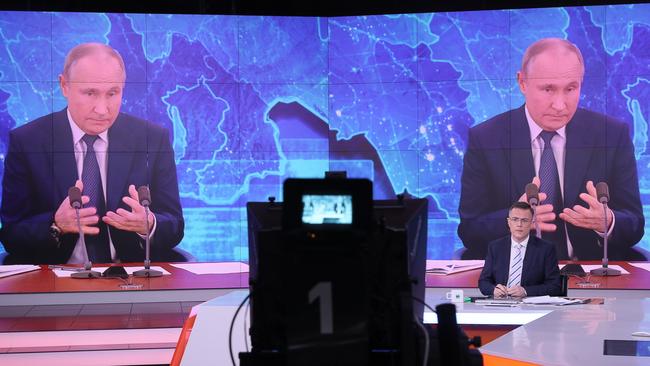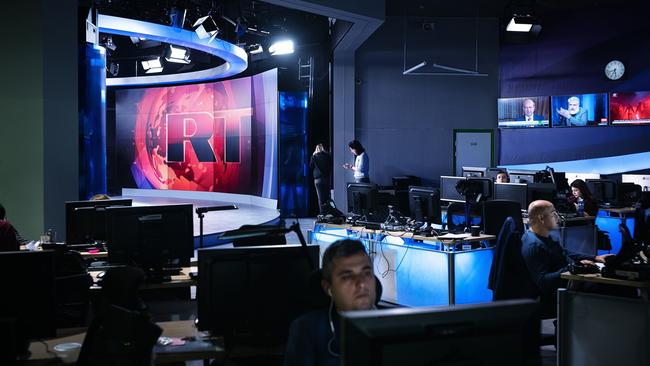Moscow’s in-house 24/7 broadcaster Russia Today feels the international heat over Ukraine coverage
Former employees of the state-controlled television network Russia Today have revealed their “ever-present feeling the Kremlin was watching” and what could happen if they stepped out of line.

In a way, it was bound to end this way. Russia Today – the Kremlin’s own 24/7 English-language news channel – was conceived almost two decades ago not by journalists or businessmen, but by Vladimir Putin’s press secretary.
Since then, it has recruited hundreds of journalists (many from the US and even Australia), waged a pro-Moscow information war, been blocked in a string of countries and been registered as a foreign agent.
Now known as RT, the broadcaster’s role in spreading Putin’s version of events in Ukraine has brought a greater level of scrutiny on it and its reporters than ever before.
Watch the channel – which claims to have a weekly audience of more than 100 million viewers globally – and you’ll get a very different version of events to most other major international news outlets televising around-the-clock updates of the Russian invasion. Is there even a war on?
“Ukraine has entered its seventh day with heavy fighting and explosions reported in several cities around the country,” one news anchor, Sean Thomas, reported solemnly on Wednesday. Russia, it seems, was almost absent.
More flashes of eruptions were shown in the city of Kharkiv.
Thomas told viewers “local authorities have blamed Russia but media reports say there were no Russia forces in the area. We are waiting for comments from the Kremlin,” he said.

An interview with retired Russian colonel Viktor Baranets was quick to deny any fault on Russia’s part. Baranets claimed it “might be part of the Ukrainian operation, the reasons for that are obvious”. He added: “It was a provocative step by Ukraine to play out an anti-Russian show, they took the fact of the explosion and spread it across social media blaming Russia.”
But former RT employees say that – even at the network’s inception – there was the “ever-present feeling the Kremlin was watching”. If they dared stray onto an unapproved narrative, serious repercussions would follow.
Since its inception, RT has been led by editor-in-chief Margarita Simonyan, a former Kremlin reporter who at just 25 took on the broadcaster’s top job and recruited dozens of journalists from international locations.
But RT is now in its own crisis, with an exodus of disgruntled journalists, including a close friend of Simonyan’s, American journalist Anissa Naouai. The channel has been dumped by its international broadcasters – including in Australia, after Foxtel pulled the pin at the weekend – while the British regulator is investigating its coverage.
James Freemantle, 56, who lives in central Victoria, was hired as a news anchor at Russia Today for six months from September 2007 to February 2008 and was based at the station’s Moscow headquarters.
His recollections of his short-lived career at the state-owned broadcaster include the stringent rules employees had to meticulously follow or suffer ramifications including being reprimanded or having their employment terminated. “I made the mistake one day of calling Chechnya a country and I got a severe reprimand because Russia doesn’t recognise Chechnya as a country, it’s a breakaway republic still belonging to Russia,” he says.
Freemantle was shown the door after just six months, but says that, still to this day, he can barely explain why his employment was terminated. “James, there’s too many reasons,” Freemantle says his manager told him.
YOUNG RECRUITS
Melbourne journalist Ahron Young, 39, was among dozens of young reporters to be employed by Russia Today when it was founded in 2005. He was given a plum position as presenter and journalist at just 23.
Young wrote a detailed expose looking back on his 11-month career at the station, recalling moments of being under the watchful eye of the Kremlin. To him, it’s no surprise RT is under attack from around the world.
Young was one of more than 80 American, British and Australian journalists hired in London and flown from the UK to Moscow’s Domodedovo Airport to start their new roles at the network in 2005.
He found an unusual workplace. “There was an ever-present feeling that the Kremlin was watching,” Young says. “There was an ‘output editor’ some of us were wary about, who watched everything we put to air. Our colleagues told us he’d worked for the intelligence agency.”
And as for the presence of Putin, Young says: “He was never there but he was always there.”
Disciplinary action was common. Any news anchor or reporter who dared go off script would face serious repercussions.
“In the first few weeks, the adjustment to Russia’s limits on free journalism were laid bare,” he says.
“One British journalist was reprimanded for referring to extremists as ‘Chechen rebels’. A rebel sounds sympathetic to the cause.”
Even the layout of the office headquarters was one that caught the attention of many employees, curious to why there were two studios – a main news station that Young says was “absolutely tiny” and a second studio that was “huge” and was only used for one show that aired one hour a week.
“I wondered why we didn’t swap studios, given the news was on 99 per cent of the time and should therefore require a larger, grander space,” Young says. The reason became clear. Putin would be interviewed on the one-hour show – he needed a bigger studio.
OFF AIR
The European Union’s foreign policy chief, Josep Borrell, this week said Russia Today and the state-owned Sputnik news agency would be banned from air, labelling them the “champions of information manipulation”.
But Simonyan has been quick to hit back, labelling the dumping of the station a move “against freedom of speech”. She said: “The EU that for years has been telling the whole world how much they treasure and love freedom of speech, how much they appreciate and love diversity of thoughts, diversity of news and information.
“Today in response to the reactions of Russia and Ukraine that are meant to protect Russian-speaking citizens there, the EU announced that we won’t broadcast there any more.
“We find some other way to communicate with our audience for sure without direct broadcasting, but the people of the EU today can see how much the talk of freedom of speech costs.”
As the Ukrainian crisis continues to unfold, there is no doubt being a journalist in Russia can be a case of life or death. An estimated 21 journalists have been killed since Putin came to power.





To join the conversation, please log in. Don't have an account? Register
Join the conversation, you are commenting as Logout